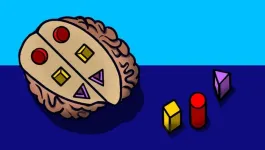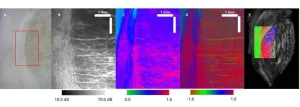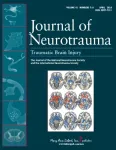(Press-News.org) New chickadee research finds cognitive skills impact lifespan
Working ‘smarter’ not harder important to natural selection and survival rates
While there is no denying ‘survival of the fittest’ still reigns supreme in the animal kingdom, a new study shows being smartest – or at least smarter – is pretty important, too.
Western University animal behaviour and cognition researcher Carrie Branch and her collaborators at the University of Nevada, Reno and the University of Oklahoma tracked the spatial cognition and lifespan of 227 mountain chickadees for more than a decade. They found the birds with better spatial learning and memory abilities (when it came to understanding their surroundings and food storing or caching strategies) lived longer.
The study, published Sept. 5 in the high impact journal Science, confirms enhanced cognitive abilities can be associated with longer lifespan in wild chickadees.
“Animals have two interests. They want to survive, and they want to reproduce, so the smart thing for them to do is whatever allows those two things to happen. We found for mountain chickadees that means knowing where to collect food, successfully storing it and remembering where they stored it so they can retrieve it later,” said Branch, a psychology professor and a principal investigator at Western’s Advanced Facility for Avian Research, a world-class facility for interdisciplinary studies of bird biology.
Cognitive ability has long been positioned as a key indicator for survival and lifespan in animals, but experiments and field tests often rely on indirect measures of mental capacity, such as brain size. Chickadees are relatively small birds and correspondingly, have small brains. Despite this seemingly physical limitation, mountain chickadees performed extremely well in the series of experiments Branch and her collaborators designed for them at a remote field site in the Sierra Nevada mountains.
“I think chickadees’ specialized cognitive abilities are a product of their social dominance structure, but we are still testing that theory. For now, we can confirm chickadees have figured out how to cache and recover food using spatial cognition and the ones that do it better, live longer,” said Branch.
Chickadees are native to North America, where they are very common. A chickadee can hide as many as 80,000 individual seeds, which they retrieve during the winter.
Living longer means more offspring too
Branch and her collaborators tested cognitive abilities in mountain chickadees using radio frequency-based feeders, which are spatially organized in groups of eight and feature motorized doors that open automatically for electronically tagged birds providing food reward when they land on the perch.
With more than a decade of data collected, the new study shows mountain chickadees with the best spatial cognitive abilities will live, on average, two years longer than those with the worst spatial cognition. Mountain chickadees breed once per year, with an average clutch size of seven eggs, and individuals with the best spatial abilities may produce more than double the number of offspring (i.e. 14 more offspring) than those with poorer cognition. In past studies, Branch and her collaborators reported females produce more offspring when paired with “smarter” males.
“This study shows that mountain chickadees with better spatial cognitive abilities are more likely to live longer, as these abilities allow them to successfully retrieve cached food while coping with harsh and unpredictable environments, including extreme weather events caused by climate change,” said Branch.
END
New chickadee research finds cognitive skills impact lifespan
Working ‘smarter’ not harder important to natural selection and survival rates, Western researchers find
2024-09-06
ELSE PRESS RELEASES FROM THIS DATE:
Cognitive behavioral therapy enhances brain circuits to relieve depression
2024-09-06
Cognitive behavioral therapy, one of the most common treatments for depression, can teach skills for coping with everyday troubles, reinforce healthy behaviors and counter negative thoughts. But can altering thoughts and behaviors lead to lasting changes in the brain?
New research led by Stanford Medicine has found that it can — if a therapy is matched with the right patients. In a study of adults with both depression and obesity — a difficult-to-treat combination — cognitive behavioral therapy that focused on problem ...
Terasaki Institute awarded $2.3 Million grant from NIH for organ transplantation research using organs-on-a-chip technology
2024-09-06
September 6, 2024 —Researchers at the Terasaki Institute for Biomedical Innovation have been awarded a multi-million grant from the National Institutes of Health (NIH) to advance research in organ transplantation and antibody-mediated rejection. This funding will facilitate the development of an innovative multi-organs-on-a-chip platform aimed at transforming our understanding of transplant rejection and immune tolerance.
Organ transplantation is widely recognized as the most effective treatment for organ failure. However, the need for lifelong immunosuppressive ...
Atoms on the edge
2024-09-06
Typically, electrons are free agents that can move through most metals in any direction. When they encounter an obstacle, the charged particles experience friction and scatter randomly like colliding billiard balls.
But in certain exotic materials, electrons can appear to flow with single-minded purpose. In these materials, electrons may become locked to the material’s edge and flow in one direction, like ants marching single-file along a blanket’s boundary. In this rare “edge state,” electrons can flow without ...
Postdoc takes multipronged approach to muon detection
2024-09-06
NEWPORT NEWS, VA – When Debaditya Biswas was a high school student in India, his math teacher, Dr. Satyabrata Das, sparked his interest in physics.
“Before I joined his class, I was really not sure what I was going to do in life,” said Biswas, a postdoctoral research associate at Virginia Tech. “He revealed the beauty of science to me.”
Now, as the 2024 Jefferson Science Associates (JSA) Postdoctoral Prize winner, Biswas hopes to reveal a new method for the U.S. Department of Energy's Thomas Jefferson National Accelerator Facility to detect muons.
By themselves, muons aren’t actually that difficult for physicists to detect. They are a type ...
Mathematical proof: Five satellites needed for precise navigation
2024-09-06
As a rule, GPS indicates our location with an accuracy of just a few meters. But we have all experienced situations where the possible error increases to a few hundred meters or the indicated location is simply wrong. One reason for this can be the small number of satellites with line-of-sight contact to the navigation device or unfavorable relative alignment of the satellites.
How does GPS work?
GPS satellites are equipped with an extremely accurate atomic clock and know their positions at all times. They continually transmit the time and their location using radio waves. A mobile phone ...
Scalable, multi-functional device lays groundwork for advanced quantum applications
2024-09-06
Researchers have demonstrated a new multi-functional device that could help advance the scalability of solid-state color centers, enabling them to be used in larger and more complex quantum computers and networks. As efficient photon-spin interfaces, solid-state color centers are promising candidates for qubit nodes — essential units for storing and processing quantum information.
Solid-state color centers are point defects that can absorb and emit light at specific wavelengths. To be useful in real-world quantum applications, they must be optically addressable in a fast and controllable manner while also allowing ...
Falling for financial scams? It may signal early Alzheimer’s disease
2024-09-06
Older adults who are more vulnerable to financial scams may have brain changes linked to a higher risk of Alzheimer’s disease, according to a first-of-its-kind study led by researchers at the USC Dornsife College of Letters, Arts and Sciences.
Nearly 7 million Americans are living with Alzheimer’s disease, the fifth leading cause of death among those 65 and older. The disease will carry an estimated $360 billion in health care costs this year alone, according to the Alzheimer’s Association.
Researchers led by Duke Han, professor ...
Integrating MRI and OCT for new insights into brain microstructure
2024-09-06
In a new study, researchers compared the orientations of nerve fibers in a human brainstem using two advanced imaging techniques: diffusion magnetic resonance imaging (dMRI)-based tractography and polarization sensitive optical coherence tomography (PS-OCT). The findings could aid in combining these techniques, which each offer unique advantages, to advance our understanding of the brain’s microstructure and help inform new techniques for early diagnosis of various brain disorders.
Isabella Aguilera-Cuenca from ...
Designing a normative neuroimaging library to support diagnosis of traumatic brain injury
2024-09-06
With recent advances in neuroimaging, moving from qualitative to quantitative outputs, an understanding is needed of what normal data look like to be able to apply these advances to diagnosis and outcomes prediction in traumatic brain injury (TBI). A new article in the peer-reviewed Journal of Neurotrauma introduces the large Normative Neuroimaging Library (NLL) to the research community. Click here to read the article now.
The American College of Radiology and Cohen Veterans Bioscience created a reference ...
Department of Energy announces $68 million in funding for artificial intelligence for scientific research
2024-09-06
WASHINGTON, D.C. - The use of Artificial Intelligence (AI) in scientific research is a top priority at the Department of Energy (DOE), which today announced $68 million in funding for 11 multi-institution projects, comprising 43 awards.
The funded projects will develop new ways to create foundation models, which are machine learning or deep learning models that can be used across a wide range of applications because they’re trained on broad data. Foundation models are a key building block of AI.
Those models will be used in computational science, to automate workflow in laboratories, to accelerate scientific programming, and much more. The possibilities ...
LAST 30 PRESS RELEASES:
Hairdressers could be a secret weapon in tackling climate change, new research finds
Genetic risk for mental illness is far less disorder-specific than clinicians have assumed, massive Swedish study reveals
A therapeutic target that would curb the spread of coronaviruses has been identified
Modern twist on wildfire management methods found also to have a bonus feature that protects water supplies
AI enables defect-aware prediction of metal 3D-printed part quality
Miniscule fossil discovery reveals fresh clues into the evolution of the earliest-known relative of all primates
World Water Day 2026: Applied Microbiology International to hold Gender Equality and Water webinar
The unprecedented transformation in energy: The Third Energy Revolution toward carbon neutrality
Building on the far side: AI analysis suggests sturdier foundation for future lunar bases
Far-field superresolution imaging via k-space superoscillation
10 Years, 70% shift: Wastewater upgrades quietly transform river microbiomes
Why does chronic back pain make everyday sounds feel harsher? Brain imaging study points to a treatable cause
Video messaging effectiveness depends on quality of streaming experience, research shows
Introducing the “bloom” cycle, or why plants are not stupid
The Lancet Oncology: Breast cancer remains the most common cancer among women worldwide, with annual cases expected to reach over 3.5 million by 2050
Improve education and transitional support for autistic people to prevent death by suicide, say experts
GLP-1 drugs like Ozempic could cut risk of major heart complications after heart attack, study finds
Study finds Earth may have twice as many vertebrate species as previously thought
NYU Langone orthopedic surgeons present latest clinical findings and research at AAOS 2026
New journal highlights how artificial intelligence can help solve global environmental crises
Study identifies three diverging global AI pathways shaping the future of technology and governance
Machine learning advances non targeted detection of environmental pollutants
ACP advises all adults 75 or older get a protein subunit RSV vaccine
New study finds earliest evidence of big land predators hunting plant-eaters
Newer groundwater associated with higher risk of Parkinson’s disease
New study identifies growth hormone receptor as possible target to improve lung cancer treatment
Routine helps children adjust to school, but harsh parenting may undo benefits
IEEE honors Pitt’s Fang Peng with medal in power engineering
SwRI and the NPSS Consortium release new version of NPSS® software with improved functionality
Study identifies molecular cause of taste loss after COVID
[Press-News.org] New chickadee research finds cognitive skills impact lifespanWorking ‘smarter’ not harder important to natural selection and survival rates, Western researchers find







